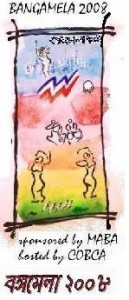ECTA Presents
“The Last Flames”
April 15, 2012; 3:00pm and 5:30pm
Fahs Theater,
Unitarian Universalist Congregation of Princeton
50 Cherry Hill Road, Princeton, NJ 08540
Written and directed by Sudipta Bhawmik
Cast: Sankar Ghoshal, Keka Sirkar, Abhijit Neogy
Music: Akaash Deep;
Sound: Dwaipayan Mukherjee, Lights: Subhodev Das
Admission: $15.00
(The event is free for active ECTA Members )
Synopsis: Basanta Koomar Roy, an expatriate journalist from India, has been credited by Tagore researchers as a key person (besides W. B Yeats and Ezra Pound) responsible for popularizing Rabindranath Tagore in USA. But Roy fell from his idol’s grace for reasons that torment many a biographer and journalist even today. “The Last Flames” attempts to re-examine the relationship between Roy and Tagore through a fictional encounter and gives us a peek at the human side of the great Poet’s personality. Samar, a young trainee journalist, comes to interview Basanta Koomar Roy at his apartment in New York city, sometime in 1948. Basanta is excited to share his experience as an Indian nationalist freedom fighter in USA. But Samar tells him that he is interested in knowing about his experience with Rabindranath Tagore, since he was the first to write Tagore’s biography in English for the American people. Basanta refuses to talk about his Gurudev until Samar uses his ultimate weapon that opens the flood gates of memories and emotions of this old admirer of Tagore.
The following obituary of Basanta Koomar Roy was published in The New York Times on June 8, 1949: Basanta Koomar Roy, Indian author and free-lance journalist, who had lived in this country for many years, died on Sunday in St. Luke’s Hospital after a brief illness. His home was at 116 West Eightieth Sreet. Born in Orissa Province, India, and a member of the Brahmin caste, Mr. Roy came to the United States around 1910 and studied at the University of Wisconsin, from which he was graduated and where he was later an extension lecturer. He was instrumental in arranging a lecture at the university in 1916 by the great Indian poet, the late Rabindranath Tagore. Mr. Roy was long a writer and speaker for Indian freedom and has been active in the Friends of Freedom for India. He was the author of a biography of Mr. Tagore and of “Dawn over India”, a book telling of the Indian underground movement against British rule.
Admission: $15.00
Contact: kaudata@yahoo.com
(The event is free for active ECTA Members )

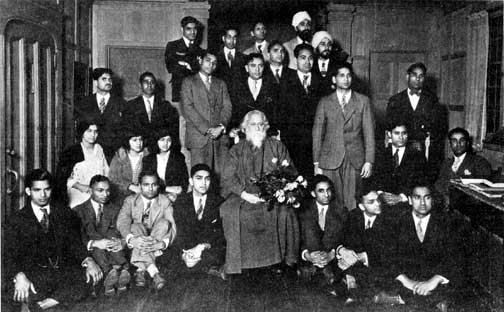
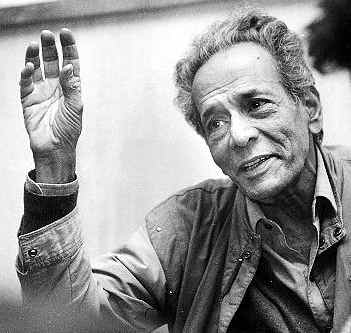
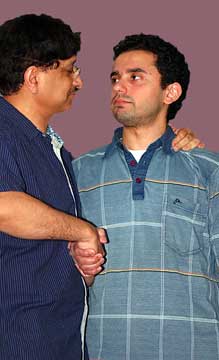
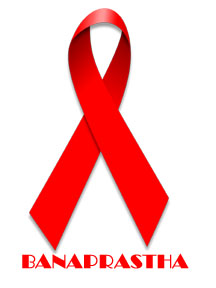 I think it was in 2004 when I met Pranay Dutta, an AIDS activist from Calcutta who was on a world tour attending several AIDS conferences in Europe, Asia and America. Pranay Dutta was then (and I understand he still is) the secretary of Sonata Foundation, an NGO in Calcutta who was trying to spread AIDS awareness in West Bengal and India through music, documentaries and performing arts. His theory was that HIV/AIDS awareness through print media was bound to be a failure in India where the majority of the affected people are illiterate. He thought that if this message can be spread out using music and performing arts then it could have the greatest impact. During my discussions with Pranay, he told me numerous incidents of how HIV and AIDS are affecting the poor Indian population. But what struck me most was the fact that how this disease was surreptitiously spreading amongst the educated, urban middle class. He told me several incidents of well-to-do middle class families affected with HIV and their attempts to hush it up, just like the way people used to do in the early half of the twentieth century when people got infected with TB or Leprosy or something similar. The fear of social back lash was more than the disease itself. Anybody infected with HIV is immediately branded as an immoral social outcast – some one who does not have the right to exist amongst the social elite. Most middle class family consider themselves immune to HIV and think that this is only a poor man’s disease. As Pranay says in one of his
I think it was in 2004 when I met Pranay Dutta, an AIDS activist from Calcutta who was on a world tour attending several AIDS conferences in Europe, Asia and America. Pranay Dutta was then (and I understand he still is) the secretary of Sonata Foundation, an NGO in Calcutta who was trying to spread AIDS awareness in West Bengal and India through music, documentaries and performing arts. His theory was that HIV/AIDS awareness through print media was bound to be a failure in India where the majority of the affected people are illiterate. He thought that if this message can be spread out using music and performing arts then it could have the greatest impact. During my discussions with Pranay, he told me numerous incidents of how HIV and AIDS are affecting the poor Indian population. But what struck me most was the fact that how this disease was surreptitiously spreading amongst the educated, urban middle class. He told me several incidents of well-to-do middle class families affected with HIV and their attempts to hush it up, just like the way people used to do in the early half of the twentieth century when people got infected with TB or Leprosy or something similar. The fear of social back lash was more than the disease itself. Anybody infected with HIV is immediately branded as an immoral social outcast – some one who does not have the right to exist amongst the social elite. Most middle class family consider themselves immune to HIV and think that this is only a poor man’s disease. As Pranay says in one of his 